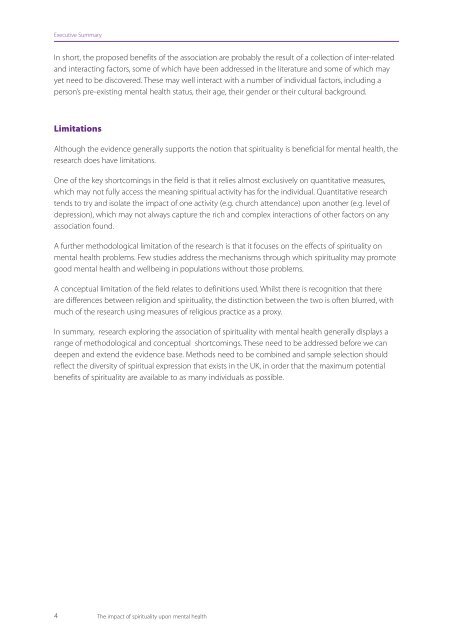The Gift of Spirituality
The Gift of Spirituality
The Gift of Spirituality
Create successful ePaper yourself
Turn your PDF publications into a flip-book with our unique Google optimized e-Paper software.
Executive summary<br />
Executive Summary<br />
Background<br />
In the past decade or so, researchers across a range <strong>of</strong> disciplines have started to explore and<br />
acknowledge the positive contribution spirituality can make to mental health. Service users and<br />
survivors have also identified the ways in which spiritual activity can contribute to mental health and<br />
wellbeing, mental illness and recovery. This report reviews the evidence and explores the impact that<br />
some expressions <strong>of</strong> spirituality can have as part <strong>of</strong> an integrative approach to understanding mental<br />
health and wellbeing.<br />
Mental health problems<br />
Anecdotal, quantitative and qualitative evidence all point to a positive (although <strong>of</strong>ten modest)<br />
relationship between spirituality and mental health in relation to a number <strong>of</strong> mental health problems.<br />
Depression is the most common mental health problem in the UK and has been the focus <strong>of</strong> much <strong>of</strong><br />
the research exploring the relationship between spirituality and mental health. <strong>The</strong> evidence shows<br />
a positive association between church attendance and lower levels <strong>of</strong> depression amongst adults,<br />
children and young people. It also shows that belief in a transcendent being is associated with reduced<br />
depressive symptoms.<br />
Similar research has examined the relationship between spirituality and anxiety or stress. Quantitative<br />
research demonstrates reduced levels <strong>of</strong> anxiety in a number <strong>of</strong> populations, including medical<br />
patients in later life, women with breast cancer, middle aged people with cardiac problems and those<br />
recovering from spinal surgery. Qualitative research also demonstrates that yoga and meditation are<br />
also associated with improvements in mental health and reductions in anxiety.<br />
<strong>The</strong>re is an emerging literature examining the association between spirituality and post-traumatic stress<br />
disorder (PTSD). One review found 11 studies that reported links between religion, spirituality, and<br />
trauma-based mental health problems. A review <strong>of</strong> these 11 studies produced three main findings. First,<br />
these studies show that religion and spirituality are usually, although not always, beneficial to people<br />
in dealing with the aftermath <strong>of</strong> trauma. Second, they show that traumatic experiences can lead to a<br />
deepening <strong>of</strong> religion or spirituality. Third, that positive religious coping, religious openness, readiness<br />
to face existential questions, religious participation, and intrinsic religiousness are typically associated<br />
with improved post-traumatic recovery.<br />
Similarly, the evidence exploring spirituality with schizophrenia is also relatively scarce. However, one<br />
review <strong>of</strong> the literature concluded that “religion plays a central role in the processes <strong>of</strong> reconstructing<br />
a sense <strong>of</strong> self and recovery”. Another found that for individuals who share the same religious values as<br />
their family, religiosity can be a cohesive and supporting factor. Others have found that people with a<br />
diagnosis <strong>of</strong> schizophrenia find hope, meaning and comfort in spiritual beliefs and practices.<br />
2<br />
<strong>The</strong> impact <strong>of</strong> spirituality upon mental health

















